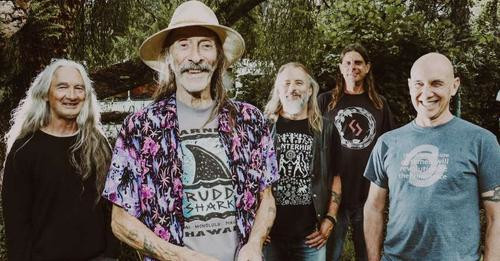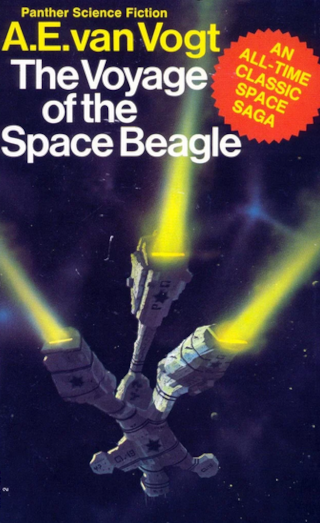
The Voyage of the Space Beagle
By A. E. van Vogt
This book comes from the "Golden Age" of science-fiction - a period usually thought of as being the 1940's. The novel itself was published in 1950 but is composed of four stories published the previous decade (a so-called "fix-up" novel). Van Vogt is a new author to me.
The Voyage of the Space Beagle is considered a classic of the science-fiction genre and contains some of his first or earliest published work. It has had a significant influence on later science-fiction, especially films like Forbidden Planet and Alien, as well as TV series like Star Trek. The setting is a spaceship on a scientific survey mission, much like Darwin's original Beagle. It encounters some alien creatures, most of whom are hostile and dangerous. As well as some exciting action, the book explores the workings of science, in particular, Vogt's ideas of the compartmentalisation of the various scientific fields - his "nexialism" discipline aims to bring them together as a whole. The book also explores relations on board between the scientists and their leadership. There is a form of democracy on the ship but also a surprising amount of discord between some members of the scientific body.
This is a short read and one that contains plenty of action, even though some of it feels slightly dated. The "Discord in Scarlet" section includes a particularly horrifying and dangerous alien, one that could inspire some nightmares in a reader less inured to modern science-fiction horror (like Alien). It might be a little old-fashioned sometimes but this is mainly the way the men (there are only men on board!) interact and think: the civilian scientists have a somewhat military bearing as well. In some ways it is refreshing: direct and to the point. Like an older black and white film, men are in suits perhaps but the film is still great. I will read more van Vogt.
As a last word: it is not uncommon for people to believe that we're cleverer today, more intelligent and sophisticated than those that came before us. At least those before the twentieth century. But this is not true. People of the Middle Ages, for instance, certainly had less scientific or technological knowledge, but were no less intelligent. I had a slight prejudice against older science-fiction in the same way but realise now how wrong this is, having read a bit now and thought about it. It is a genre of ideas and the science or technology is just one aspect, and not necessarily an important one.
The Science Fiction Encyclopedia has an entry on the Golden Age of science-fiction. This is a great resource. Online only now but I was very lucky to find a paperback copy going cheaply in a charity shop a few months ago.
I visited the Burrell for the first time a few weeks ago. I've been meaning to visit for years.
The main reason to go was a look at the Degas exhibition before it closed. Being a huge admirer of the works of the great French artist, the exhibition was the big push I needed to get over there. I took the bus for a change, then a short (two stop) train journey from Glasgow Central (to Pollokshaws West), a short walk through the lovely park and arriving at the newly refurbished and fixed Collection building. It's been closed for a few years to have its roof fixed.
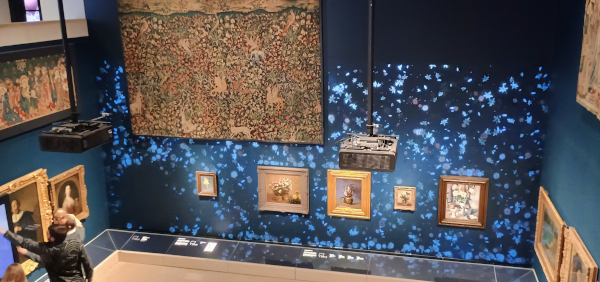 Above: One of the Burrell's display rooms.
Above: One of the Burrell's display rooms.
What can we say about Degas? He's usually classed as an "Impressionist", having exhibited in their exhibitions over the years (from 1874), but his work always differed substantially from the other artists so described (like Monet). He is famous for his portraits of people at work, whether ballet dancers or washer-women. An artist of the city and modern life. He did not paint en plein air as most of the Impressionists did (in fact, he was highly critical of the practice). The Burrell Collection shows how great a draftsman he was: drawings in pencil or pastel, a favourite medium.
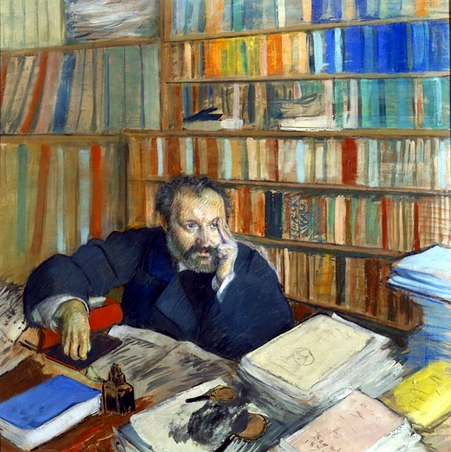
Licensed under a Creative Commons Attribution-NonCommercial 4.0 International License.
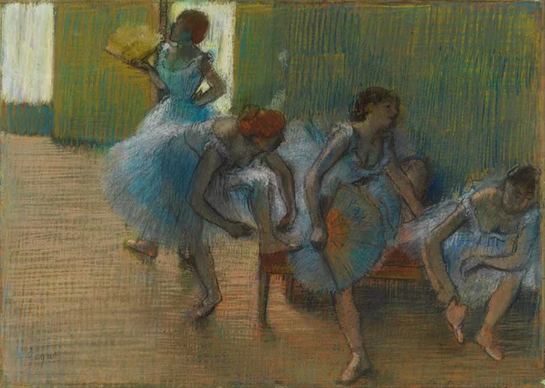
Licensed under a Creative Commons Attribution-NonCommercial 4.0 International License.
I had a look around the rest of the collection of course and it's impressive. A bit like a mini-Victoria and Albert museum, with a collection of furniture, tapestries, carpets, armour and ceramics: amongst many other things. I was lucky on the day, with the sunshine streaming through the windows and showing off some stained glass to good effect. I'll definitely visit again. With this and the Kelvingrove Museum, Glasgow has some great attractions.
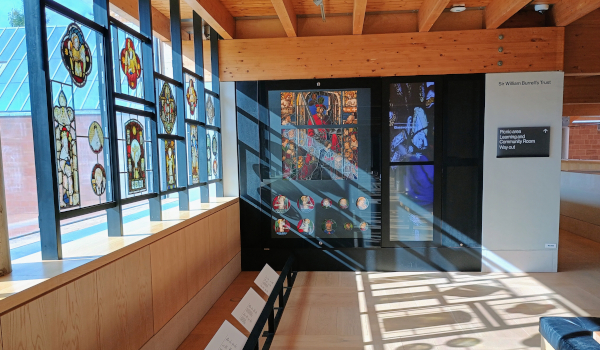
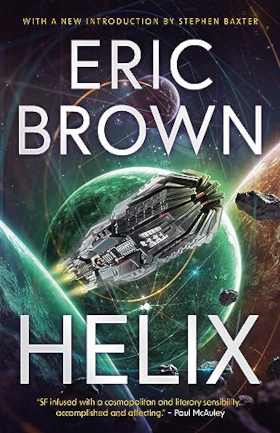
Helix
By Eric Brown
British author Eric Brown was new to me, until a brief mention on the Outlaw Bookseller's YouTube channel a while ago and then a recommendation by the owner of Transreal Fiction. His 2007 novel Helix was described as a good introduction.
Well, this was a great read: an exciting and action packed science-fiction adventure story.
A colony spaceship, a crash landing, almost immediate problems with hostile aliens and then a hard journey of discovery: not new ideas and nothing groundbreaking, but Brown tells the story so well, who cares? It starts well and stays good - and then mid-way through the book is a big surprise. An unexpected twist like this can really raise everything to another level. He creates believable and sympathetic characters (both the human and non-human) and we find we care about them. In addition,the book's lean and without the usual "fat" book bloat so many of the well-known science-fiction authors tend towards nowadays. A very refreshing and pacy novel that stands on its own (even though there is a sequel I will almost certainly read).
It is such a shame that Eric died in 2023.
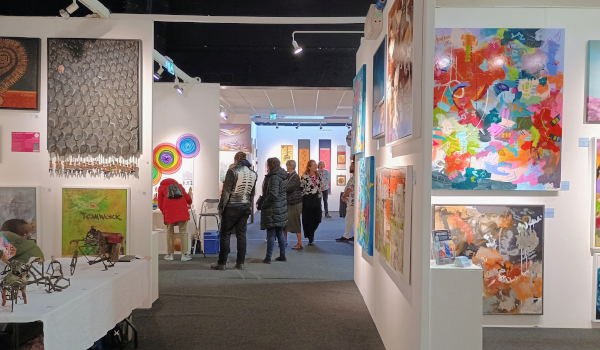
I went to the Edinburgh Art Fair 2024 at the O2 Academy a couple of weeks ago. I've been for the past few years and went on a Friday to skip crowds at the weekend. It was certainly quiet, perhaps quieter than I expected.
The usual mix of good and mediocre ... and some bad. All a personal opinion of course: I go to this sort of thing because I love looking at art, particularly paintings. But I am always surprised (but shouldn't be by now) what sort of terrible stuff some people like. Then again, art can be all sorts of things to different people and many times it is just "home decoration" - like a mirror or a house plant. It's good if the sofa colour compliments the abstract painting. There's nothing wrong with that and, in fact, I occasionally paint something with a view to wanting a particular mood or atmosphere on my wall.

Kirsten Mirrey had a booth. I love her oil painting, seeing her work at the Abbeymount Studios open day a few months ago. Amongst many works, she had a very large (and just finished) oil painting up on the wall: a deer in the highlands. She seems to be doing very well (and that's not a surprise).
Right: Freedom. An oil painting by Kirsten Mirrey (from her web site).
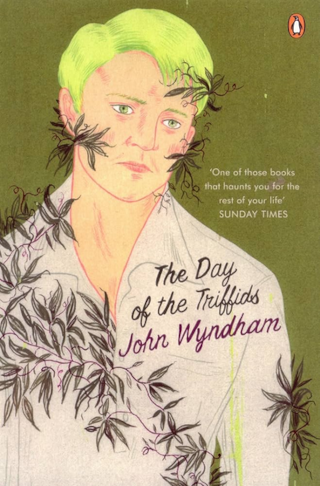
The Day of the Triffids
By John Wyndham
A classic novel of science-fiction. The Day of the Triffids is a thoroughly enjoyable read: well written, exciting and thought provoking.
Many (perhaps most) people will be familiar with the story but they might have it a bit wrong, as I did. I've seen at least one film or TV adaptation a long time ago and had a slightly skewed idea of the book, which turns out to be more intelligent and much better. In fact, the cause of the "Triffid" invasion and the mass blindness is either different to what I thought, or more nuanced.
The tale of the end of civilisation is still chilling, even though there have been countless other books of a similar kind since. Wyndham does not dwell on the horror but is good at making us see how bad things are and what a bleak future could be unfolding. The horror or despair is secondary to the reaction of the people that survive and how they cope: from utter despair to a glimmer of hope, and back again. Part of the story is a search for someone lost, a search in the huge deserted land turning to desolation and wilderness, with the ever increasingly threat of the alien triffids. And, what of being on your own? Bill Mazen starts to realise that threats are not all external. Loneliness is something a sociable species is also prey to :
Something that lurked inimically all around, stretching the nerves and twanging them with alarms, never letting one forget that there was no one to help, no one to care. It showed one as an atom adrift in vastness, and it waited all the time its chance to frighten and frighten horribly - that was what loneliness was really trying to do: and that was what one must never let it do ...
It is easy to see why the book was a success. Maybe post-war Britain was in a gloomy mood and people were prepared to contemplate how fragile our world is. It still is. But rather than close with a despair, one can perhaps close with some hope that there are some that will rebuild. This was written in the 50's after all, and gloomier books came later. The Day of the Triffids is a marvelous novel that I expect will be read again.
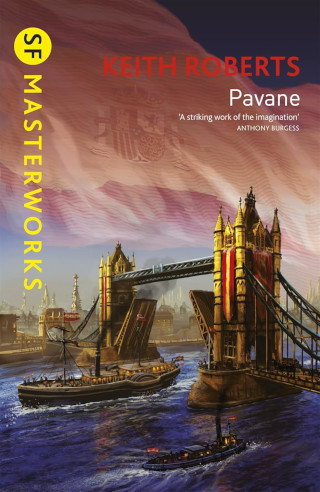
Pavane
By Keith Roberts
Pavane is Keith Roberts' best known novel and considered a classic work of alternative history. The alternative historical stream makes this "science-fiction".
The book takes place in a Britain dominated by the Roman Catholic church and there has been no Protestant Reformation (it was crushed at birth). The cause of this was the fact that the Spanish Armada managed a landing in England and there was a Catholic uprising with Queen Elizabeth assassinated. What would today's Britain be like, hundreds of years after such events?
The suggestion here is: no industrial revolution, science and technology severely circumscribed, capitalism neutered, an entrenched social hierarchy and a mighty church (including an inquisition). Before the 19th Century, people did not expect the world to change much over time, if at all. "Progress" didn't happen and change was slow: but it can happen. People are still intelligent and inventive and some want freedom to explore and think new things.
Roberts' novel is set in the South West of England, primarily Dorset and surrounds. It is suffused with a rural, old-world flavour as you would expect but, more unexpectedly, harkening back to a more distant, possibly pre-Christian, past. He has an obvious love for this countryside and perhaps the old magic still lingers here. The episodic style gives us a flavour of the state of the world through the eyes of a steam-powered business entrepreneur, a boy being trained in the Signalling guild and a high-born woman chafing at the strictures imposed by a powerful Church. They are linked by family or setting. Times are changing.
The background is believable and quite British. The tale is a realistic exploration of this possible future: not quite the novel I expected but still fresh and interesting.
I bought a new keyboard and went with an HP 230 wireless model that includes a wireless mouse. It's inexpensive and only for use with in my living room, so not heavily used. I have not used it much yet but it seems fine so far. I would not want to use it for much "proper" typing though. The keys are "chiclet" style with little action.
There is always a "setup" sheet with this sort of thing: inserting the batteries, turning on mouse etc. It is always small with tiny text. Often not very useful.
But why can HP not also include a guide to what the keyboard "icons" mean? I'm familiar with many but some are a little mysterious. Technology "Icons" are supposed to make functionality clear.

I don't know what the "F1" icon means.
Or the "F2". Although F2 works as usual for "rename" in a file manager.
"F3" cut I assume. "F4" copy?
Anyway, it is such a small thing to document, why not do it? I could not find this information online.
I have been using a Logitech diNovoEdge keyboard in my lounge since 2009. It still works but has started to become a little unreliable sometimes and it loses connection for 5-10 seconds more and more often. It's been much used and I think it is a great keyboard for the lounge/TV. It is much better than any of the other wireless keyboard/trackpad keyboards I have tried: they are often poorly designed and also a low quality build. It is a real shame Logitech stopped making them years ago. Anyway, time to try something else.
The Prime of Miss Jean Brodie
By Muriel Spark
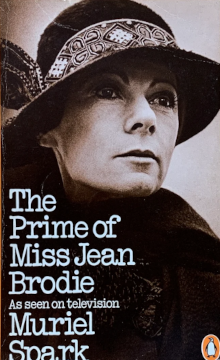
Spark's novel is short, sharp, witty and ascerbic. She has a great ear for dialogue between the young schoolgirls under the spell of their charismatic teacher. A wonderful book.
Written in the late 1950's, it is set in the Edinburgh of the 1930's. World War One is still a presence but the effects of the depression has only a fleeting appearance in this more affluent world. Jean Brodie is a teacher at an Edinburgh girls school with a particular outlook on life. She is cultured, one could say snooty, loves High Art and looks down on science. Edinburgh is strait-laced and proper but there are some rough edges, as seen by the "Brodie Set" themselves during a walk through the Old Town. They come across a long line of men queuing in the street :
Monica Douglas whispered, "They are the Idle."
"In England they are called the Unemployed. They are waiting to get their dole from the labour bureau," said Miss
Brodie.
Jean Brodie takes holidays in Italy and admires Mussolini. She remarks that "In Italy the unemployment problem has been solved". How is left unsaid.
Children are very impressionable. Teachers are a big influence and in a position of trust. In modern parlance, they are "influencers". Today, of course, social media presents a much larger and more powerful array of "influencers", with pernicious effects sometimes. It's clear why parents have to care a lot about who you mix with as a child because their acquaintances have a bigger impact than you do. Like Jonathan Haidt, Professor of Ethical Leadership at NYU, we should be worried about the power of social media on children.
What I particularly liked about the book was Spark's dry and funny way with the children's dialogue. Sometimes silly, fantastical or funny. Occasionally, a little nasty (poor Mary MacGregor). She captures it beautifully.
"Miss Brodie says prime is best", Sandy said.
"Yes, but she never got married like our mothers and fathers."
"They don't have primes," said Sandy
"They have sexual intercourse," Jenny said.
The little girls paused, because this was still a stupendous thought, and one which they had only lately
lit upon; the very phrase and its meaning was new. It was quite unbelievable.
A very approachable and funny book, and still relevant today.
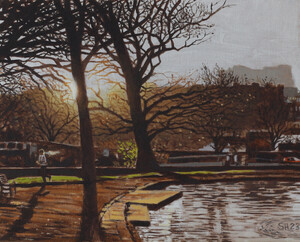
I have made a new web site to show art work I have created :
This is the first time I have done any "mobile" friendly web site work: mobile first. So I have also tried to familiarise myself with CSS features like flexbox layout etc. It has all been a learning experience. The Javascript "lightbox" is something I've taken from elsewhere (see below). I am now painfully aware of how unfriendly my main blog is to mobile and, at some point, I might have to try and fix this.
In the meantime, please check out the new site.
WARNING: The art site includes a "lightbox" (using lightbox2 but this does not work well on mobile devices. I may completely remove the lightbox, or try and replace with something else. More work needing done!
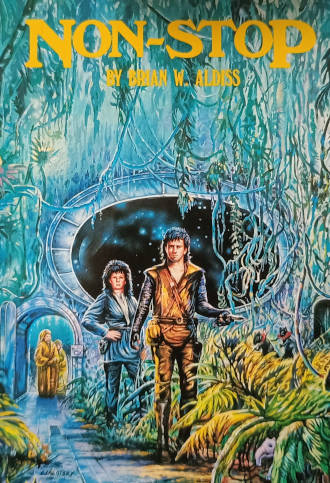
Non-Stop
By Brian Aldiss
To travel hopefully is a better thing than to arrive ...
R. L. Stevenson
Aldiss has this Stevenson quote front and center at the start of his first science-fiction novel: a short and pacy adventure published in 1958. By the end, you might also understand why.
The US title was "Starship", which gives some of the game away unfortunately.
Right: The cover of the old US hardback I have. Surprisingly, using the British "Non-Stop" title. The graphic design and artwork is, let us say, of its time. Publisher: Carroll & Graf 1989.
I enjoyed this book a lot: Aldiss has obviously thought through the sort of things that might happen if humans have to live on an interstellar spaceship for a very long time. Think of features of speech, custom, culture, religion and all manner of human relationships. We are a fractious people. Space travel is hard on us and our bodies.
The ship in use here would be called a "generation" ship today: a well used trope of science-fiction since this was written (Aldiss might have been the first to write about it properly). The galaxy is so big that the human brain cannot fully grasp the numbers involved; they are just so large. I am not sure we would survive such a journey, but if we did, it might end up something like this. I made some assumptions here and thought I had a good idea what the end would bring, but I was surprised and wrong. A good book, and shows you can pack a lot into less than two-hundred pages.
We are all dying, just at different speeds.
-- Thomas Crowwell in The Mirror and the Light.
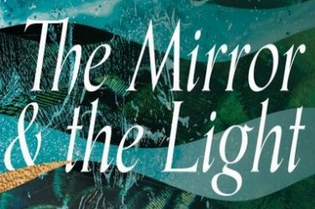
The Mirror and the Light
By Hilary Mantel
We know how the story ends. Boleyn dies by the sword. Cromwell, the axe. Others die in very much worse ways as the authorities cut a swathe through the country. After some initial success, the Pilgrimage of Grace is bloodily suppressed by a vengeful King. Robert Aske, one of the leaders, was killed in a very cruel way. This episode features in H.F.M. Prescott's Man on a Donkey (a book I read a few years ago and thought good).
Cromwell keeps his own secret book about Henry where he writes down his thoughts and observations about the King in an attempt to understand him. In this final novel, Cromwell is much more introspective.
This last book did not disappoint me in any way. As a series, they are perhaps the best books I've read and have left a lasting legacy to me. I will return to them I'm sure.

The Mirror and the Light is the final volume in Mantel's Wolf Hall trilogy. I savoured the text all the more as I approached the final pages, waiting for the axe to fall and wondering how such an ending would be treated in the first person she uses. There has been some criticism (see wikipedia), mostly regarding the historical accuracy, but she's mostly had high praise. This is "fiction" we must remember but it is very hard not to find the world she creates entirely believable: the food, the smell, the weather and the people. I will almost certainly re-read the whole lot sometime, once again.
Mantel died in 2022. Thank goodness she lived to complete this.
And to finish :
Below: The original axe and block used during the execution of high-profile prisoners.
Photograph : By mwanasimba from La Réunion - Tower of London, CC BY-SA 2.0, link
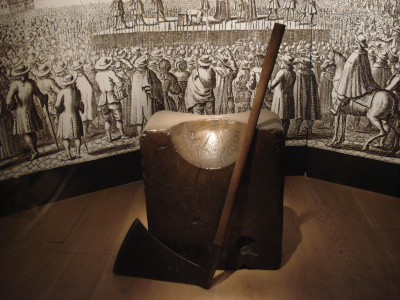
From atlasobscura : This particular ax was last recorded as being used in 1747 for the execution of the Scottish Baron and Jacobite Lord Simon Fraser of Lovat, who, as a Highlander, fought against the Hanoverian forces during the battle of Culloden.
I came across a Publishing Weekly article about book sales recently. It appears that the types of books doing well, and keeping the sales numbers more respectable, are the so-called "Romantasy" books, a neologism that compresses "Romance" and "Fantasy". The cliché would be: romance books with magic included. I also see that Amazon have Romantasy colouring books but I hesitate to draw any conclusions from this.
Authors Sarah J. Maas and Rebecca Yarros are mentioned as being the current big sellers. I think I first heard the term "romantasy" from Stephen E Andrews on his YouTube channel Outlaw Bookseller and now can't help but see these books. His point was that the "Science Fiction" genre is shrinking and the "Fantasy" one grows, and it is all a matter of basic economics. Publishers go where the money is and their budgets are spent there. It's a shame that "science fiction" and "fantasy" are both dumped into the same bucket.

Maas certainly has a lot of momentum behind her, as you can see on the huge list of "midnight release parties" planned for her next book.
On the right: a photograph from her Instagram page of one of her book signings.
According to the article Boys Need Books by Myke Bartlett in The Critic, the publishing industry is majority female now: readers, authors, agents, editors, marketers. No doubt there are many factors at play here: possibly some over-correction of the previous male domination in years gone by. It's not a bad thing per se except how it might result in a different allocation of resources to the detriment of some market segments. A lot of the marketing is social media now of course: we have things like BookTube and BookTok (and I admit to liking a few YouTube "BookTube" channels). Maas has two million Instagram followers. Whatever she and other "Romantasy" authors are doing, it's working. But looking at the photo from her meetup above: where are the boys?
If boys don't read when young it might be difficult to start later. Maybe video games and screen time are an aspect of this but it's also possible that fewer books appeal to a boy nowadays. I'm sure publishers can do better.

On the left: Rebekah Greenway ("Booknuts") shows off her Midjourney and Photoshop skills in the service of Romantasy book characters. This is a picture from her Instagram page.
Midjouney? From their docs page :
Midjourney is an independent research lab exploring new mediums of thought and expanding the imaginative powers of the human species. We are a small self-funded team focused on design, human infrastructure, and AI.
So, there you are. You prompt the computer on what sort of picture you want and the "AI" will generate it and you then iterate on this (I assume). This is called generative AI. I wonder how many of these books are also written by an AI now? That seems a bit of a scary thought to me.
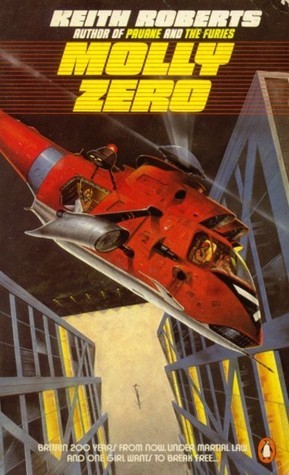
Molly Zero
By Keith Roberts
Score: 4/5
Molly Zero is a slim novel first published in 1980. Classified as "science-fiction", it is an adventure story set in the near future about a young runaway from "boarding school" and her escape to London from the North. Roberts is new to me but he has been much praised by Stephen E Andrews on his YouTube channel Outlaw Bookseller. Seeing the paperback in a second-hand shop at a reasonable price, I picked it up.
The future Britain here is much changed by some large catastrophe. The country is split into smaller units with names like Lothia, Cumbria and Wessex, each with a border but trading together. The economy is basic but technology exists, including aircraft, computers and hallmarks of a surveillance state. A government and police are ever present but in the background mostly; It is dystopian. Molly is a young girl brought up in (what appears to be) a boarding school, one of many called "Blocks". She wants to see the sea but the boy she runs away with wants to get to London and he gets his way. We follow their journey as they make their way, including a period with a Romany ("gypsy") travelling circus. There is a mystery about the source of the national damage, who is in charge, if there really are "elites" and where the young people in the Blocks fit. The novel speaks in Molly's voice throughout, the "second person present tense", an unusual choice but it works. As the tale progresses, Molly learns some hard truths about the world and how far some people will go to fight against the powers in charge.
The book is well written, short and pacy. The period spent in the circus with the Romany is very well observed and Roberts does well with the character of the young people and the society of the travellers they join. By all accounts, he was a difficult man to get on with and this seems to have negatively affected his written output (or at least the published part). I'll be reading Pavane sometime in the near future; a novel some consider his masterpiece.
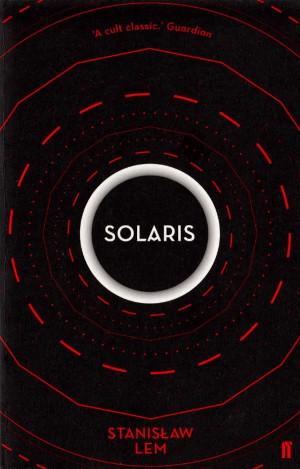
Solaris
by Stanisław Lem
Score: 4/5
Solaris is generally considered one of the greatest science-fiction novels ever written. Stanisław Lem (1921-2006), a Polish writer, published the novel in 1961 while the country was under Soviet control.
The story concerns the arrival of a scientist to a research station that sits above a vast ocean covering the whole of the planet Solaris. It is quickly apparent that all is not well: an unexplained death as well as erratic and unusual behaviour from the remaining two scientists. Extremely odd things are happening.
The "ocean" of Solaris is very different to anything on Earth: a chemical soup, organic, inorganic, colloidal. It displays unusual behaviour (to say the least), including forming huge structures within itself; these sometimes stretch many miles and are of huge complexity. It seems to exhibit intelligence. Is it sentient? This vast alien environment is the center of a large research effort and body of "Solarist" literature.
When you're in the mood to read a book, you are much more likely to enjoy it; something I have become much more aware of in the past few years. Being short also helps. Solaris is well written and the translation seems good (in my Faber&Faber edition the translators are Joanna Kilmartin and Steve Cox) but there are some sections that are more difficult. These are lengthy extracts from "Solarist" scientific research literature and are often dry and can be dull. Although my eyes glazed over occasionally, these writings did expand on the strangeness of the planet. It is still an environment I found very difficult to visualise however. This is a "first contact" story but of a "sideways" kind: the fact that the contact is with something we just cannot understand at all is the core of the book. It is eerie, even creepy, and our many questions are never really answered. Much like the scientists, we have a lot of theories about the planet, but no real idea of what is going on.
The novel is a short, sharp exploration of what a true "alien" contact might be and also a look at how humanity sees itself as it ventures out exploring the cosmos. The novel's been filmed twice now. I've seen neither film but will try to watch them sometime.
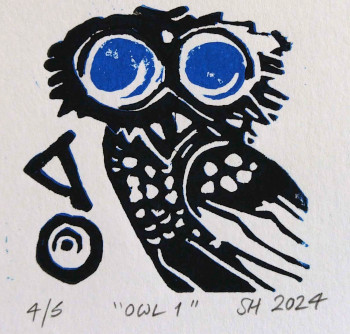
I've been trying my hand at linocut printing, perhaps the easiest sort to do at home. I've been wanting to try printing for a long time. There's no need for a course of training or in-person instruction: just have a go. It's quite easy to get something on paper quickly (even if just basic shapes) and it is cheap to get going as well. YouTube is full of instructional videos.
Right: My fourth lino print, and my first done in more than one colour.
I've now done about five prints, including a couple in multiple colours, one of which you can see to the right.
The colour prints are created using the reduction method: the first (usually lightest) colour is rolled and printed, then you cut out a little more lino where you want to keep this colour. Then roll the next colour and print again. Things can go wrong ... but so far not in a ruinous way!
In the picture below you can see the three stages of the three colour print "owl2": firstly turquoise (right-most), then, going right to left, the second colour blue added and then black to complete. The lino block is shown above the prints alongside the cutting tool I used.
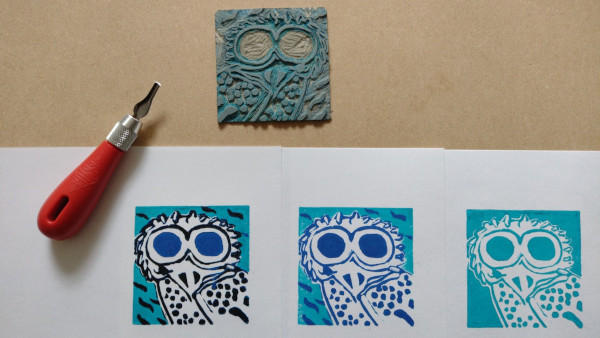
Like any creative endeavour, practice is what gets you better. Right now I'm back to an oil painting but linocut printing is great fun. The focus of carving the block feels a little like a form of meditation. Time passes quickly.
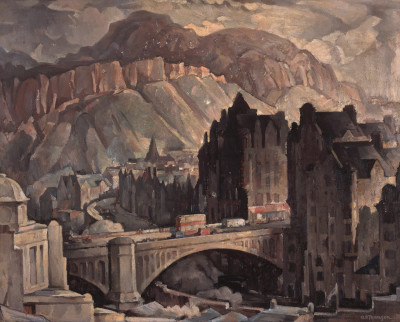
Above:Edinburgh North Bridge and Salisbury Crags, oil
I visited the City Art Centre at the weekend to see their exhibition Adam Bruce Thomson: The Quiet Path. Thomson is a little known Edinburgh artist of the 20th Century.
The "quiet path" is a reference to his unassuming nature and low profile. Thomson (1885-1976) was an Edinburgh born artist and spent almost his entire life in the city, including a long spell teaching at Edinburgh College of Art. The college was formed in its present state (and site) in 1907, and Thomson was a student himself in the early days.
The exhibition is over two floors and shows his flexibility in oil paint, drawing and print making. I was also particularly drawn to some great pastel pictures, colourful and bright.
Adam Bruce Thomson is much less known today than some of his more famous contemporaries and that is a shame. Hopefully this small exhibition raises his profile because he deserves a wider audience.
The exhibition runs at the City Art Centre in Edinburgh until Sunday October 6th 2024 and is free.
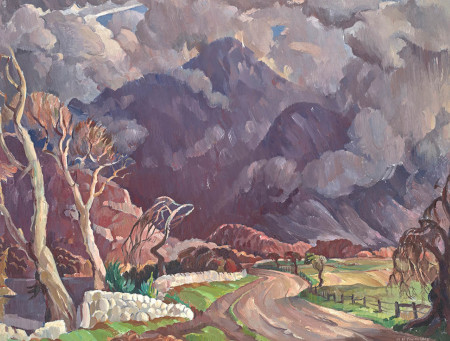
Above:The Road to Ben Cruachan, 1932, oil
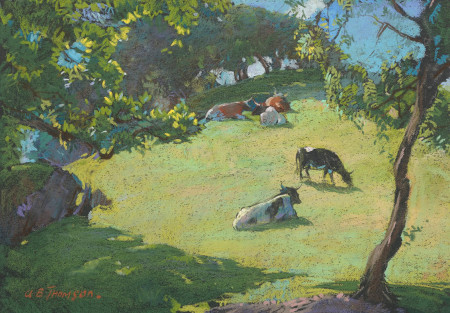
Above:Trees and Cattle, Colvend, 1920's, pastel
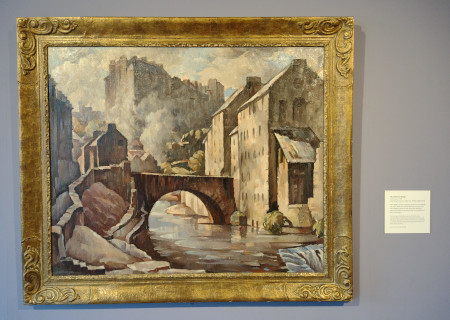
Above:The Old Dean Bridge, 1932, oil
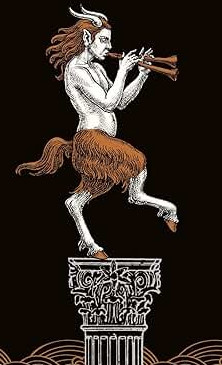
Piranesi
By Susanna Clarke
Score: 3/5
Susanna Clarke had quite a bit of success with her 2004 novel Jonathan Strange & Mr Norrell. I liked it, but it's a long book and I had to slog through some of it. You need to be in the right mood to immerse yourself in an alternate magic-suffused Victorian world, with a writing style to match.
Piranesi is her most recent novel, published in 2021. This is a much shorter book, less than 300 pages, but in a similar vein to Jonathan Strange: quite strange and fantastical. A man wanders around a large, many roomed mansion "house", multi-levelled, ramshackle in parts and containing hundreds of strange statues. Some statues on plinths and some seemingly bursting through the walls. With an occasional missing roof, the rain and low cloud might chill the air, and the sea can come crashing through the building. He seems to have a rough and mean form of existence but, child-like, he seems happy enough.
It is quite hallucinatory and odd; some form of larger picture emerges slowly from Clarke's careful interleaving of fragments the "Piranesi" character puts together over the course of time. This is not reality as we know it.
What I most like about Clarke's writing is her positioning of "magic" as being something that is far from the modern conception: a bit of a conjuring trick, superficial entertainment or illusion. Magic is a more primal aspect of the natural world and something to be very wary of indeed. It can be beautiful, perhaps wondrous but also awful and frightening. A "fairy" in this world (see Jonathan Strange and Mr Norrell in particular) might be intelligent as well as completely malevolent. You don't want one to take a dislike to you. There are no fairies in Piranesi but there are dark undercurrents of hidden or forgotten knowledge; perhaps best left that way. Beguiling and strange, it was short enough to stay interesting until the end. An enjoyable distraction from the modern world.

The Dervish House
By Ian McDonald
Score: 5/5
It's sometimes the case that I read a book, want to review it but either never get round to it, or start a review and never finish it. For a book I enjoyed as much as The Dervish House by Ian McDonald, I really need to make that extra effort. This 2011 novel deserves high praise.
It is a little different from the start: the setting is a near future Istanbul, a city with a vast history and a multitude of stories. The novel has been classed as "sci-fi", even a form of "cyberpunk", but designations such as these, like so many genre pigeon-hole's, do it a disservice. Yes, there are some futuristic elements: advanced personal technology, nano-technology, AI. And we mustn't forget the shape-shifting robots! But it takes these elements and treats them the same way we treat our smart-phones, crypto-currency and AI chat-bots. They're part of the scenery, or a child's toy.
Whatever the genre, it's a thriller and adventure story. A nano startup chasing financial investment and also a missing "document" essential to this. A wheeler and dealer commodity trader trying to pull off a less than straight-up deal. A hunt for a mysterious historical artifact, perhaps only a legend. A bomb on a tram that might cause more than physical damage. A boy's dangerous game spying on people who have a monstrous plan. And an old man with a chance at getting back at a past tormentor and perhaps a reconciliation with a lost love. There is lots going on and many threads to keep our interest, with a small cast of believable, funny and colourful characters. I think I did laugh out loud at least once.
There's action, emotion and tension but what raises the book far above the average is the setting in the ancient city and our immersion in it, old meeting the new. A very good, well written novel and an author I will be sure to pick up again.

I've recently finished reading Paul Pope's graphic novel "100%". I thought it was excellent.
I hadn't heard of Pope or seen anything by him until I saw a video review of the first issue of his 1995 comic "THB" on the Cartoonist Kayfabe channel. The channel's been a source of some great material and I hope it manages to survive the recent terrible events.
THB is a very early Pope comic, self-published from the mid-1990's. As soon as the boys opened it up it was intriguing: different just looking at the title and graphic design. The first thing I noticed about the art was the fluidity of the ink style, quite obviously brush driven rather than pen. Using a brush for inking is much less common, even back before digital production took off.
"100%" dates from the early 2000's but, again, you can see the dynamic black and white brush-work and his recognisable style in full effect. There's an organic quality that I think only a brush can fully exhibit. There is a "Paul Pope" face and figure style.
On top of the great comic art, the actual story itself is good. The story is an aspect of a comic that is often less developed, if not sometimes puerile (with some notable exceptions of course). Adults need something better and "100%" is that, just don't expect superheroes or explosions. From what I can see, Pope does pretty well selling original art as well. Definitely someone worth reading.

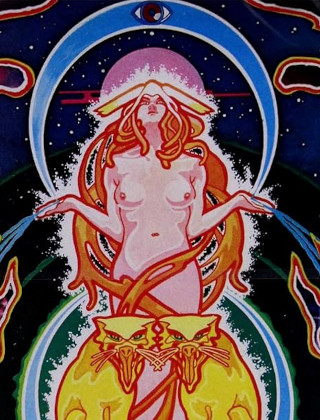
I saw Hawkwind live in concert last weekend. I haven't seen them live in years: decades in fact. Dave Brock is the cornerstone of the band of course and the last remaining original. He might be creaking a bit, but at 82 you have to give him huge respect for keeping things going and doing his bit for psychedelic space-rock. He looked good and played well: I hope I'm as fit as he is when I reach that age.
"Spirit of the Age" from the album Quark, Strangeness and Charm, stood out for me. I don't think I've ever heard it live before. That was a great album and definitely hugely enhanced by Robert Calvert's song writing. Great to hear it live.
I missed out on their last concert up here (their 50th anniversary tour) and was kicking myself for not going. Not even Hawkwind can go on forever but, luckily for me, they don't know when to stop touring. And good luck to them.
